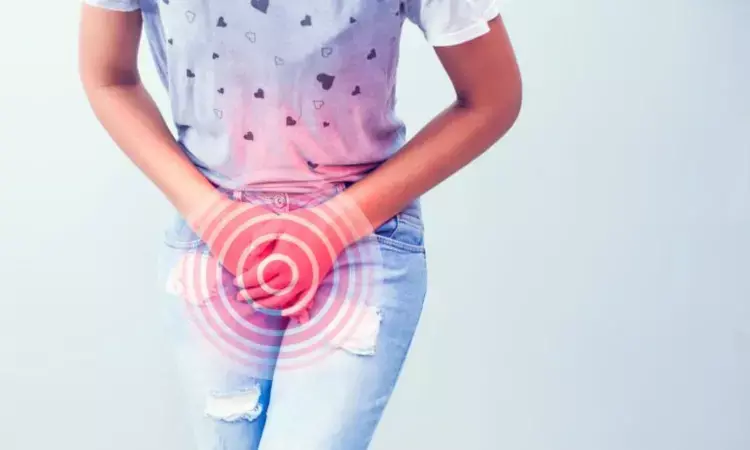- Home
- Medical news & Guidelines
- Anesthesiology
- Cardiology and CTVS
- Critical Care
- Dentistry
- Dermatology
- Diabetes and Endocrinology
- ENT
- Gastroenterology
- Medicine
- Nephrology
- Neurology
- Obstretics-Gynaecology
- Oncology
- Ophthalmology
- Orthopaedics
- Pediatrics-Neonatology
- Psychiatry
- Pulmonology
- Radiology
- Surgery
- Urology
- Laboratory Medicine
- Diet
- Nursing
- Paramedical
- Physiotherapy
- Health news
- Fact Check
- Bone Health Fact Check
- Brain Health Fact Check
- Cancer Related Fact Check
- Child Care Fact Check
- Dental and oral health fact check
- Diabetes and metabolic health fact check
- Diet and Nutrition Fact Check
- Eye and ENT Care Fact Check
- Fitness fact check
- Gut health fact check
- Heart health fact check
- Kidney health fact check
- Medical education fact check
- Men's health fact check
- Respiratory fact check
- Skin and hair care fact check
- Vaccine and Immunization fact check
- Women's health fact check
- AYUSH
- State News
- Andaman and Nicobar Islands
- Andhra Pradesh
- Arunachal Pradesh
- Assam
- Bihar
- Chandigarh
- Chattisgarh
- Dadra and Nagar Haveli
- Daman and Diu
- Delhi
- Goa
- Gujarat
- Haryana
- Himachal Pradesh
- Jammu & Kashmir
- Jharkhand
- Karnataka
- Kerala
- Ladakh
- Lakshadweep
- Madhya Pradesh
- Maharashtra
- Manipur
- Meghalaya
- Mizoram
- Nagaland
- Odisha
- Puducherry
- Punjab
- Rajasthan
- Sikkim
- Tamil Nadu
- Telangana
- Tripura
- Uttar Pradesh
- Uttrakhand
- West Bengal
- Medical Education
- Industry
Recurrent Uncomplicated Urinary Tract Infections in Women: AUA/CUA/SUFU Guideline, 2022

UTI is a highly prevalent, costly, and burdensome condition affecting women of all ages, races, and ethnicities without regard for socioeconomic status, or educational level.2 The incidence and prevalence of rUTI depend on the definition used. Approximately 60% of women will experience symptomatic acute bacterial cystitis in their lifetime.3 An estimated 20-40% of women who have had one previous cystitis episode are likely to experience an additional episode, 25-50% of whom will experience multiple recurrent episodes.
In 2022 AUA,CUA and SUFU jointly released guidelines on Recurrent Uncomplicated Urinary Tract Infections in Women. For the purposes of this guideline, the Panel considers only recurrent episodes of uncomplicated cystitis in women. "Uncomplicated" means that the patient has no known factors that would make her more susceptible to develop a UTI, while "complicated" indicates that other complicating factors may put one at higher risk for UTI and decreased treatment efficacy.
Following are its major recommendations:
1. Clinicians should obtain a complete patient history and perform a pelvic examination in women presenting with rUTIs. (Clinical Principle)
2. To make a diagnosis of rUTI, clinicians must document positive urine cultures associated with prior symptomatic episodes. (Clinical Principle)
3. Clinicians should obtain repeat urine studies when an initial urine specimen is suspect for contamination, with consideration for obtaining a catheterized specimen. (Clinical Principle)
4. Cystoscopy and upper tract imaging should not be routinely obtained in the index patient presenting with a rUTI. (Expert Opinion)
5. Clinicians should obtain urinalysis, urine culture and sensitivity with each symptomatic acute cystitis episode prior to initiating treatment in patients with rUTIs. (Moderate Recommendation; Evidence Level: Grade C)
6. Clinicians may offer patient-initiated treatment (self-start treatment) to select rUTI patients with acute episodes while awaiting urine cultures. (Moderate Recommendation; Evidence Level: Grade C)
7. Clinicians should omit surveillance urine testing, including urine culture, in asymptomatic patients with rUTIs. (Moderate Recommendation; Evidence Level: Grade C)
8. Clinicians should not treat ASB in patients. (Strong Recommendation; Evidence Level: Grade B)
9. Clinicians should use first-line therapy (i.e., nitrofurantoin, TMP-SMX, fosfomycin) dependent on the local antibiogram for the treatment of symptomatic UTIs in women. (Strong Recommendation; Evidence Level: Grade B)
10. Clinicians should treat rUTI patients experiencing acute cystitis episodes with as short a duration of antibiotics as reasonable, generally no longer than seven days. (Moderate Recommendation; Evidence Level: Grade B)
11. In patients with rUTIs experiencing acute cystitis episodes associated with urine cultures resistant to oral antibiotics, clinicians may treat with culture-directed parenteral antibiotics for as short a course as reasonable, generally no longer than seven days. (Expert Opinion)
12. Following discussion of the risks, benefits, and alternatives, clinicians may prescribe antibiotic prophylaxis to decrease the risk of future UTIs in women of all ages previously diagnosed with UTIs. (Conditional Recommendation; Evidence Level: Grade B)
13. Clinicians may offer cranberry prophylaxis for women with rUTIs. (Conditional Recommendation; Evidence Level: Grade C)
14. Clinicians should not perform a post-treatment test of cure urinalysis or urine culture in asymptomatic patients. (Expert Opinion)
15. Clinicians should repeat urine cultures to guide further management when UTI symptoms persist following antimicrobial therapy. (Expert Opinion)
16. In peri-and post-menopausal women with rUTIs, clinicians should recommend vaginal estrogen therapy to reduce the risk of future UTIs if there is no contraindication to estrogen therapy. (Moderate Recommendation; Evidence Level: Grade B)
Reference:
Jennifer Anger, Una Lee, A. Lenore Ackerman, Roger Chou, Bilal Chughtai, J. Quentin Clemens, Duane Hickling, Anil Kapoor, Kimberly S. Kenton, Melissa R. Kaufman, Mary Ann Rondanina, Ann Stapleton, Lynn Stothers, and Toby C. Chai, https://doi.org/10.1097/JU.0000000000000296
Dr Kamal Kant Kohli-MBBS, DTCD- a chest specialist with more than 30 years of practice and a flair for writing clinical articles, Dr Kamal Kant Kohli joined Medical Dialogues as a Chief Editor of Medical News. Besides writing articles, as an editor, he proofreads and verifies all the medical content published on Medical Dialogues including those coming from journals, studies,medical conferences,guidelines etc. Email: drkohli@medicaldialogues.in. Contact no. 011-43720751


